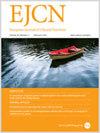急性髓性白血病患者在强化化疗期间的营养状况变化及其与身体和临床结果的关系。
IF 3.6
3区 医学
Q2 NUTRITION & DIETETICS
引用次数: 0
摘要
背景/目的:急性髓性白血病(AML)或骨髓增生异常综合征(MDS)患者在接受强化缓解诱导治疗期间通常会接受医学营养治疗(MNT)。由于人们对这一患者群体的营养状况变化,特别是身体成分变化知之甚少,因此我们对这些变化及其与身体和临床结果的关系进行了评估:在这项多中心前瞻性观察研究中,纳入了新诊断的急性髓细胞白血病/骨髓增生异常综合症患者,这些患者接受了强化缓解诱导化疗、营养师提供的常规饮食咨询以及在营养摄入不足时立即进行的营养强化治疗。在开始治疗和出院时,对患者的营养状况(包括患者主观全面评估(PG-SGA)分数和身体成分)、身体状况和疲劳进行了评估。采用多元回归分析法研究了营养状况/身体成分与身体状况、疲劳、发热持续时间、并发症数量、中性粒细胞移植时间和住院时间(从病历中收集)之间的关系:在126例急性髓细胞白血病/骨髓增生异常综合征患者中,超过91%的患者营养摄入充足,其中61%的患者接受了MNT治疗。尽管如此,体重却明显下降(P接受强化化疗的急性髓细胞白血病/骨髓增生异常综合征患者尽管接受了营养强化治疗,但肌肉/FFM仍有所下降,而FM则保持不变。营养状况的维持与体能和临床结果的改善有关。本文章由计算机程序翻译,如有差异,请以英文原文为准。
Changes in nutritional status and associations with physical and clinical outcomes in acute myeloid leukemia patients during intensive chemotherapy
Patients with acute myeloid leukemia (AML) or myelodysplastic syndrome (MDS) often receive medical nutrition therapy (MNT) during intensive remission-induction treatment. Since little is known about changes in nutritional status, specifically body composition, in this patient population, these changes and their associations with physical and clinical outcomes were assessed. In this multicenter prospective observational study, newly diagnosed AML/MDS patients who received intensive remission-induction chemotherapy, routine dietary counseling by a dietician and MNT immediately upon inadequate nutritional intake, were included. At treatment initiation and discharge, nutritional status, including Patient-Generated Subjective Global Assessment (PG-SGA)-scores and body composition, physical outcomes and fatigue were assessed. Associations of nutritional status/body composition with physical outcomes, fatigue, fever duration, number of complications, time to neutrophil engraftment and hospital length of stay (LOS) (collected from medical records) were examined using multiple regression analysis. In >91% of the 126 AML/MDS patients included, nutritional intake was adequate, with 61% receiving MNT. Nevertheless, body weight decreased significantly (p < 0.001) and mainly consisted of a loss of muscle/fat-free mass (FFM) (p < 0.001), while fat mass (FM) remained unchanged (p-value range = 0.71–0.77). Body weight and waist circumference showed significant negative associations with fever duration and/or number of complications. Significant positive associations were found between mid-upper arm muscle circumference (MUAMC) and physical functioning and between PG-SGA-scores and fatigue. Body weight and MUAMC were also negatively associated with LOS. Despite MNT in AML/MDS patients undergoing intensive chemotherapy, muscle/FFM decreased while FM remained unchanged. Maintenance of nutritional status was associated with improved physical and clinical outcomes.
求助全文
通过发布文献求助,成功后即可免费获取论文全文。
去求助
来源期刊
CiteScore
10.60
自引率
2.10%
发文量
189
审稿时长
3-6 weeks
期刊介绍:
The European Journal of Clinical Nutrition (EJCN) is an international, peer-reviewed journal covering all aspects of human and clinical nutrition. The journal welcomes original research, reviews, case reports and brief communications based on clinical, metabolic and epidemiological studies that describe methodologies, mechanisms, associations and benefits of nutritional interventions for clinical disease and health promotion.
Topics of interest include but are not limited to:
Nutrition and Health (including climate and ecological aspects)
Metabolism & Metabolomics
Genomics and personalized strategies in nutrition
Nutrition during the early life cycle
Health issues and nutrition in the elderly
Phenotyping in clinical nutrition
Nutrition in acute and chronic diseases
The double burden of ''malnutrition'': Under-nutrition and Obesity
Prevention of Non Communicable Diseases (NCD)

 求助内容:
求助内容: 应助结果提醒方式:
应助结果提醒方式:


